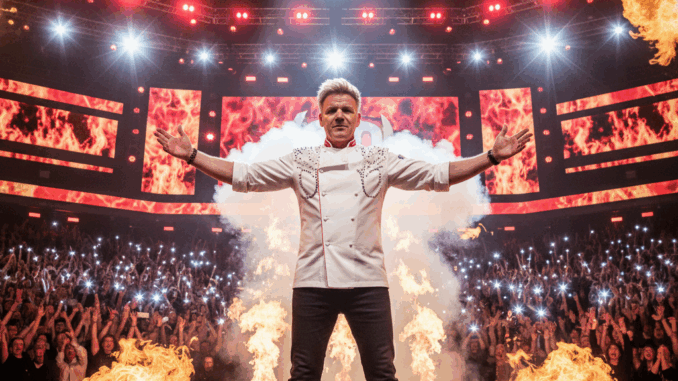
When Gordon Ramsay storms into a room—on screen or off—it feels less like a chef entering and more like a cultural event unfolding. His shows are not just about food; they are reflections of the way we live, work, and fight for success. Whether it’s the battlefield tension of Hell’s Kitchen, the emotional resurrections of Kitchen Nightmares, or the globe-trotting ambition of Uncharted, Ramsay’s television empire has transformed him into something far bigger than a chef: he is a cultural icon, a mirror of ambition, rage, and resilience.
The Man Who Turned Cooking Into Combat
Before Ramsay, cooking competitions were polite, even gentle. Shows focused on technique, elegance, and presentation. Ramsay changed that formula forever. By treating kitchens like war zones—complete with shouting, breakdowns, and the infamous “idiot sandwich” moment—he tapped into something primal that audiences couldn’t look away from. His shows became less about the food and more about survival, creating a format that other reality programs across genres still copy to this day.

Why Audiences Can’t Look Away
The appeal isn’t just Ramsay’s temper. His shows resonate because they capture the modern hunger for pressure, speed, and transformation. Watching Kitchen Nightmares, viewers see failing businesses rebuilt under crushing deadlines, reflecting their own fears about collapse and hope for second chances. In MasterChef Junior, audiences experience the opposite: encouragement, mentorship, and the surprising tenderness of Ramsay with children.
He oscillates between villain and savior, between drill sergeant and father figure, and that paradox is what keeps his shows endlessly watchable.
The Global Reach of a Brand
Ramsay’s shows are broadcast in over 200 territories. In some countries, his outbursts are subtitled, sometimes softened—but the energy translates universally. In fact, his “brand of fury” has been studied in media schools as a case study in cross-cultural communication: the way anger, authority, and passion can bypass language barriers.
The Future of Ramsay’s Television Empire
With whispers of new formats blending survival reality and culinary spectacle, Ramsay continues to innovate while other reality stars fade. Critics may call his methods cruel, but ratings prove otherwise. And in an era where attention is the rarest currency, Gordon Ramsay remains one of the few figures who can command it instantly.
Conclusion: The Fire That Doesn’t Burn Out
Gordon Ramsay isn’t just making TV shows—he’s making cultural milestones. His brand of entertainment taps into something deeper than food: the chaos of ambition, the brutality of failure, and the thrill of second chances. Love him or hate him, one thing is clear: Ramsay’s fire is far from extinguished.